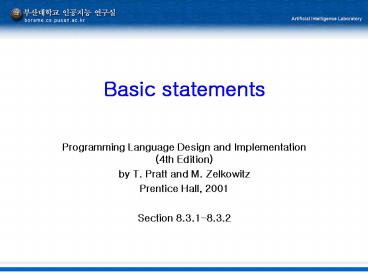Basic statements PowerPoint PPT Presentation
1 / 9
Title: Basic statements
1
Basic statements
- Programming Language Design and Implementation
(4th Edition) - by T. Pratt and M. Zelkowitz
- Prentice Hall, 2001
- Section 8.3.1-8.3.2
2
Assignment
- Basic attribute for imperative languages,
although syntax differs - A B Pascal, Ada
- A B C, FORTRAN, PL/I, Prolog, ML,
SNOBOL4 - MOVE B TO A COBOL
- A ? B APL
- (SETQ A B) LISP
- Note that LISP, an applicative language, has an
assignment. Most LISP programmers do not write
purely applicative programs. - C has multiple ways to assign AB, A, ...
- How many C assignment operations can you identify?
3
Explicit sequence controls
- Early languages used labels on statements and
explicitly determined location of branches (early
FORTRAN) - IF (A.GT.7) GOTO 100
- ...
- 100 CONTINUE ? Explicit control
- This is the goto controversy of the early
1970s. Languages do not need explicit control and
concept is not used or needed even if present. - C includes a break statement for exit out of a
loop. It is a limited form of goto, that also has
its problems with correctness.
4
Control structures
- Basic control structures Programs need 4 basic
structures - A sequencing between statements
- A conditional for choosing alternatives
- A Loop construct
- A function call for calling subroutines. (We
consider subprograms elsewhere in this course.)
5
Sequencing
- Compound statement Typical syntax
- begin
- statement1
- statement2
- ...
- end
- Execute each statement in sequence.
- Sometimes (e.g., C) ... used instead of
- begin ... end
6
Conditional
- The if statement is typical
- if expression then statement1 else statement2
- if expression then statement1
- The expression is evaluated and if true, the then
clause is executed, otherwise the else clause is
executed. If there is no else clause, then the
next statement is executed. - Since a begin statement is a statement, the then
or else clause can be an arbitrary number of
commands. - As with everything else in C, its austere syntax
for if is if (expression) statement1 else
statement2
7
Iteration
- Four iterations are most common
- while expression do statement - Evaluate
expression and if true execute statement. Then
repeat process. - Repeat statement until expression - Execute
statement and then evaluate expression. Quit if
expression is now true. - For loop - Specify a count of the number of times
to execute a loop - for I1 to 10 do statement
- for(I0Ilt10 I) statement
- perform statement 10 times
- Indefinite iterations (Ada)
- loop
- exit when condition
- end loop
- foreach X(_at_arrayitem)statement Perl
- for(var x in arrayitem) statement - Java
8
Case statement
- A form of multiway branch (similar to if)
- case Tag is
- when 0 gt begin
- statement0
- end
- when 1 gt begin
- statement1
- end
- when 2 gt begin
- statement2
- end
- when others gt begin
- statement3
- end
- end case
9
Implementation of case

